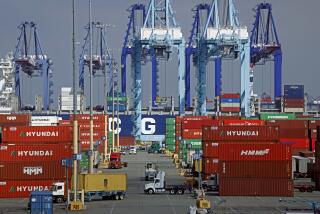Justice Department Announces Breakup of Price-Fixing Conspiracy on Fax Paper : Antitrust: Three firms and former company chief agree to pay $6 million to settle criminal charges.
- Share via
WASHINGTON — Justice Department officials, hailing unprecedented cooperation with their Canadian counterparts, Thursday announced the breakup of a $120-million-a-year price-fixing conspiracy in the sales of thermal fax paper throughout North America.
Officials said a Japanese corporation, two American subsidiaries of Japanese companies and a former president of one U.S. firm have agreed to plead guilty to criminal antitrust charges and pay fines of more than $6 million.
The international cartel allegedly raised the cost of thermal facsimile paper sold in 1991 and 1992 by at least 10%, affecting mainly small businesses and home fax machine owners throughout North America.
Anne K. Bingaman, chief of the antitrust division, said the case started with a complaint from a Toronto businessman about the price of fax paper. This led to cooperation between Canadian and U.S. officials in interviewing witnesses and sharing of confidential investigative information under a 3-year-old mutual assistance treaty.
Bingaman and George Addy, director of investigation for the Canadian Bureau of Competition Policy, told reporters that the price-fixing case was the first major use of the 1991 treaty and the convictions were the first obtained under it.
“We went forward in this together working as a team,” Bingaman said. The fax case is being pursued further, she added, and there are other non-fax areas of investigation between the two countries.
The three firms involved--Kanzaki Specialty Papers Inc. of Ware, Mass.; Mitsubishi Corp. of Tokyo, and Mitsubishi International Corp. of New York--controlled 40% to 45% of the thermal fax paper market in the United States.
“I think consumers will pay less for fax paper as a result,” Bingaman said.
In a statement, Atty. Gen. Janet Reno added, “Foreign firms that want to do business in the U.S. must take our antitrust laws seriously and must play by our rules of fair competition when setting prices to be paid by U.S. consumers.”
Of more than $6 million in fines, the Kanzaki firm agreed to pay $4.5 million and its former president, Kazuhiko Watanabe, a Japanese national living in Tokyo, has been assessed $165,000 in criminal fines. Kanzaki also is paying a fine of $686,000 in Canada.
Mitsubishi Corp., a Japanese trading house with worldwide sales of $130 billion in many products, agreed to pay a fine of $1.26 million. Mitsubishi International of New York will pay a $540,000 criminal fine.
In court papers, officials said the defendants and unnamed co-conspirators met in July, 1991, in Upstate New York and in subsequent telephone calls agreed to increase the price of jumbo-roll thermal fax paper in North America. Jumbo rolls, weighing up to 2,000 pounds, are unwound and cut into smaller rolls for use in fax machines and are less expensive than the thicker fax paper used by most large companies.
Thermal paper is coated with a chemical composition that allows it to accept images by a transfer of energy from a thermal print head. Known as “the curly type,” it is used primarily by small businesses and on home fax machines.
Kanzaki said in a statement that the price-fixing violation was “an isolated incident” and that it has “taken steps to ensure it will not happen again.” The Massachusetts firm said it has cooperated fully with the Justice Department and “resumed a competitive pricing structure.”
More to Read
Inside the business of entertainment
The Wide Shot brings you news, analysis and insights on everything from streaming wars to production — and what it all means for the future.
You may occasionally receive promotional content from the Los Angeles Times.










